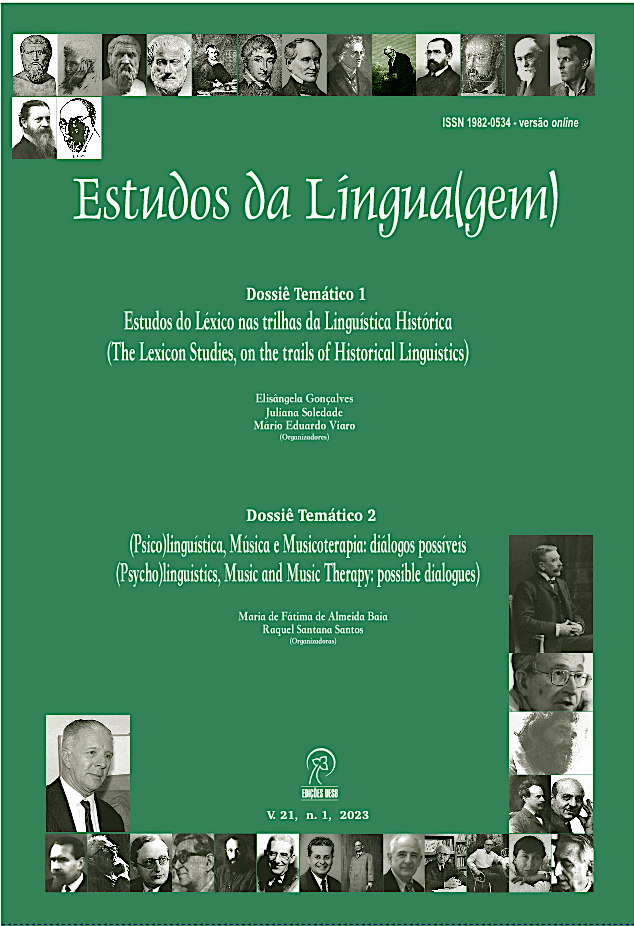The toponym ‘Roraima’ used in blend words
DOI:
https://doi.org/10.22481/el.v21i1.9883Keywords:
Cruzamento vocabular; Composição; Léxico; Roraima.Abstract
The present paper is comprised within the field of Lexical Morphology, more specifically of word blend, and aims to analyze blend words stemming from the toponym ‘Roraima’, with attention to morphophonological, orthographic and discursive aspects. The methodology consists of identifying and collecting the corpus (57 words), which tasks were conducted mostly online, and complemented by in loco observation in the city of Boa Vista (RR). Results show that ‘Roraima’ is a productive lexical basis for the formation of new commercial and institutional toponyms in the city of Boa Vista, where ‘Rorai-’, ‘-raima’ or ‘-aima’ are combined with other words. Word blend also implies other morphological and phonological processes, such as acronym formation, monotongation and the use of bound forms and suffixoids. These blend words highlight the identity and sociolinguistic features of the Portuguese spoken in the state of Roraima, especially in relation to trade.
Downloads
References
ALVES, I. M. Neologismos. São Paulo: Ática: 1990.
ANDRADE, K. E.; RONDININI, R. B. Cruzamento vocabular: um subtipo da composição? DELTA, v. 32, p. 861-887, 2016. Disponível em: < https://www.scielo.br/j/delta/a/NHKKfy8CJMGBXyZRsc7fTLR/?lang=pt&format=pdf>. Acesso em: 05 de agosto 2021.
ARONOFF, M.; FUDEMAN, K. What is Morphology. 2 ed. Malden-USA/Oxford-UK: Blackwell Publishing, 2011.
AZEREDO, J.C. Fundamentos da gramática do português. Rio de Janeiro: Zahar, 2000.
BASÍLIO, M. M de P. Teoria lexical. 7. ed. São Paulo: Ática, 2004.
BASÍLIO, M. M. de P. A Fusão Vocabular como Processo de Formação de Palavras. In: IV Congresso Internacional da ABRALIN, 4, 2005, Brasília. ANAIS... Brasília: [s.n], 2005. Disponível em: <https://www.abralin.org/site/wp-content/uploads/2013/02/anaiscongresso05.pdf>. Acesso em: 10 agosto 2021.
BASÍLIO, M. M. de P. Fusão vocabular expressiva: um estudo da produtividade e da criatividade em construções lexicais. In: Encontro nacional da associação portuguesa de linguística, 15, 2010, Porto. ANAIS... Porto: APL, 2010. Disponível em: < https://apl.pt/wp-content/uploads/2017/09/15-Margarida-Basilio.pdf. Acesso em: 23 setembro 2021.
CARDOSO, E. de A. Cruzamentos lexicais no discurso literário. Estudos linguísticos, São Paulo, v. 39, n. 1, p. 214-222, 2010. Disponível em: < https://www.revistas.usp.br/flp/article/view>. Acesso em: 05 setembro 2021.
CORREIA, M.; ALMEIDA, G. M. B. Neologia em português. São Paulo: Parábola, 2012.
GONÇALVES, C. A. V. Blends lexicais em português: não-concatenatividade e correspondência. Revista Veredas, Juiz de Fora, v. 14, n.1, p. 16-35, 2003. Disponível em: < https://periodicos.ufjf.br/index.php/veredas/article/view/25272>. Acesso em: 10 agosto 2021.
GONÇALVES, C. A. A ambimorfemia de cruzamentos vocabulares: uma abordagem por ranking de restrições. Revista da ABRALIN, [s.l], v. 5, n. 1 e 2, p. 169-183, 2006. Disponível em: < https://revista.abralin.org/index.php/abralin/article/view/945>. Acesso em: 12 agosto 2021.
GONÇALVES, C. A.; ANDRADE, K. E.; ALMEIDA, M. L. L. de. Se a macumba é para o bem, então é boacumba: análise morfoprosódica e semântico-cognitiva das substituições sublexicais em português. Revista Linguística, Rio de Janeiro, v. 6, n. 2, p. 47-62, 2010. Disponível em: <https://revistas.ufrj.br/index.php/rl/article/view/4447>. Acesso em: 20 setembro 2021.
GONÇALVES, C. A. V. Morfologia. São Paulo: Parábola, 2019.
LAROCA, M. N. C. Manual de morfologia do português. 4. ed. Campinas: Pontes, 2005.
STOCKWELL, R.; MINKOVA, D. English Words: History and Structure. 2 ed. Cambridge: Cambridge University Press, 2009.
RIO-TORTO, G. Blending, cruzamento ou fusão lexical em português: padrões estruturais e (dis)semelhanças com a composição. Filologia e Linguística Portuguesa, São Paulo, v. 16, n. 1, p. 7-29, 2014. Disponível em: < https://www.revistas.usp.br/flp/article/view/83491>. Acesso em: 14 agosto 2021.
RIO-TORTO, G. et al. Gramática derivacional do português. 2 ed. Coimbra: Imprensa da Universidade de Coimbra, 2016.
RODRIGUES, L. S. Neologia antroponímica: o que os nomes de origem germânica têm a nos dizer?. 655f. Dissertação (Mestrado) – Programa de Pós-Graduação em Filologia e Língua Portuguesa, Universidade de São Paulo, São Paulo, 2019.
SANDMANN, A. J. Competência lexical: produtividade, restrições e bloqueio. Curitiba: EDUFPR, 1991.
SANDMANN, A.J. Morfologia lexical. Curitiba: EDUFPR, 2020.
SILVA, V. B. O cruzamento vocabular formado por antropônimos: análise morfológica e fonológica. 184f. Dissertação (Mestrado em Letras Vernáculas) – Programa de Pós-Graduação em Letras Vernáculas, Universidade Federal do Rio de Janeiro, Rio de Janeiro, 2019.
Downloads
Published
How to Cite
Issue
Section
License
Copyright (c) 2023 Language Studies

This work is licensed under a Creative Commons Attribution 4.0 International License.

Estudos da Língua(gem) is licensed under a Creative Commons Attribution 4.0 International License.
Authors who publish in the journal Estudos da Língua (gem) agree with the following terms:
The journal Estudos de Língua(gem) maintains the copyrights of the contributions published. These rights include the publication of the contribution and make its content available for free through the portal.







